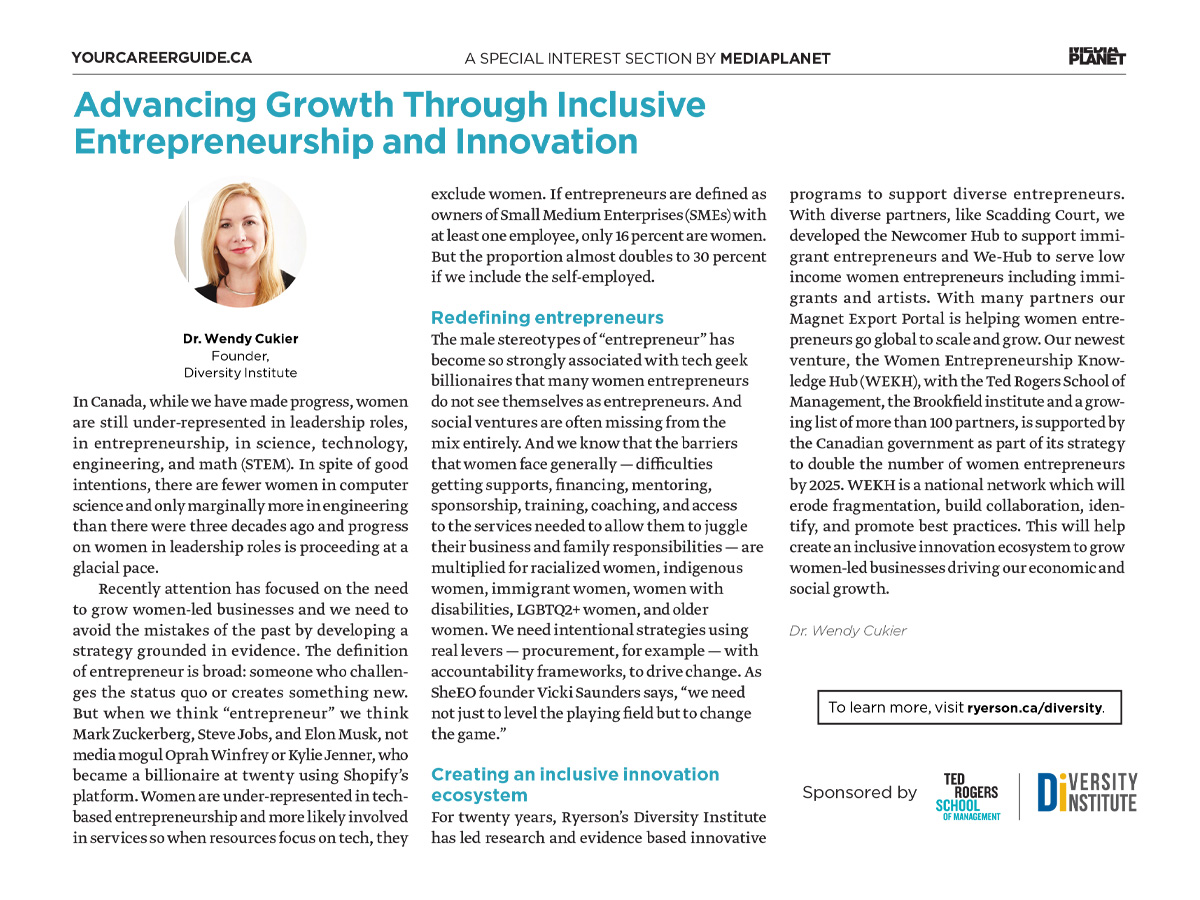Advancing Growth Through Inclusive Entrepreneurship and Innovation

In Canada, while we have made progress, women are still under-represented in leadership roles, in entrepreneurship, in science, technology, engineering, and math (STEM). In spite of good intentions, there are fewer women in computer science and only marginally more in engineering than there were three decades ago and progress on women in leadership roles is proceeding at a glacial pace.
Recently attention has focused on the need to grow women-led businesses and we need to avoid the mistakes of the past by developing a strategy grounded in evidence. The definition of entrepreneur is broad: someone who challenges the status quo or creates something new. But when we think “entrepreneur” we think Mark Zuckerberg, Steve Jobs, and Elon Musk, not media mogul Oprah Winfrey or Kylie Jenner, who became a billionaire at twenty using Shopify’s platform. Women are under-represented in techbased entrepreneurship and more likely involved in services so when resources focus on tech, they exclude women. If entrepreneurs are defined as owners of Small Medium Enterprises (SMEs) with at least one employee, only 16 percent are women. But the proportion almost doubles to 30 percent if we include the self-employed.
We know that the barriers that women face generally are multiplied for racialized women, indigenous women, immigrant women, women with disabilities, LGBTQ2+ women, and older women.
Redefining entrepreneurs
The male stereotypes of “entrepreneur” has become so strongly associated with tech geek billionaires that many women entrepreneurs do not see themselves as entrepreneurs. And social ventures are often missing from the mix entirely. And we know that the barriers that women face generally — difficulties getting supports, financing, mentoring, sponsorship, training, coaching, and access to the services needed to allow them to juggle their business and family responsibilities — are multiplied for racialized women, indigenous women, immigrant women, women with disabilities, LGBTQ2+ women, and older women. We need intentional strategies using real levers — procurement, for example — with accountability frameworks, to drive change. As SheEO founder Vicki Saunders says, “we need not just to level the playing field but to change the game.”
Creating an inclusive innovation ecosystem
For twenty years, Ryerson’s Diversity Institute has led research and evidence based innovative programs to support diverse entrepreneurs. With diverse partners, like Scadding Court, we developed the Newcomer Hub to support immigrant entrepreneurs and We-Hub to serve low income women entrepreneurs including immigrants and artists. With many partners our Magnet Export Portal is helping women entrepreneurs go global to scale and grow. Our newest venture, the Women Entrepreneurship Knowledge Hub (WEKH), with the Ted Rogers School of Management, the Brookfi eld institute and a growing list of more than 100 partners, is supported by the Canadian government as part of its strategy to double the number of women entrepreneurs by 2025. WEKH is a national network which will erode fragmentation, build collaboration, identify, and promote best practices. This will help create an inclusive innovation ecosystem to grow women-led businesses driving our economic and social growth.
Dr. Wendy Cukier
As published in MediaPlanet's Women in STEM publication, 2019.